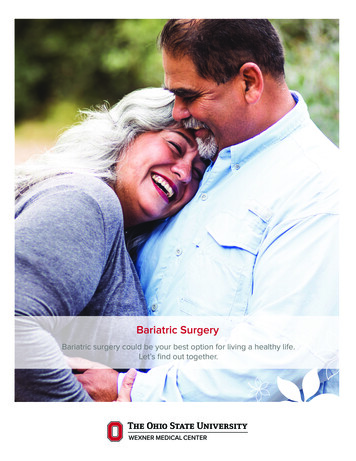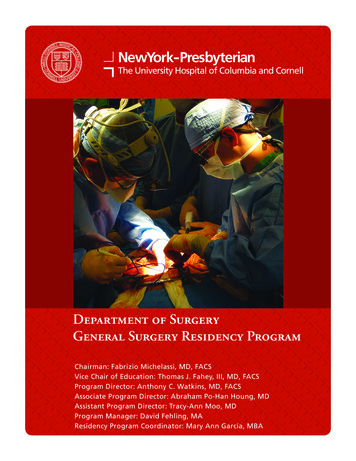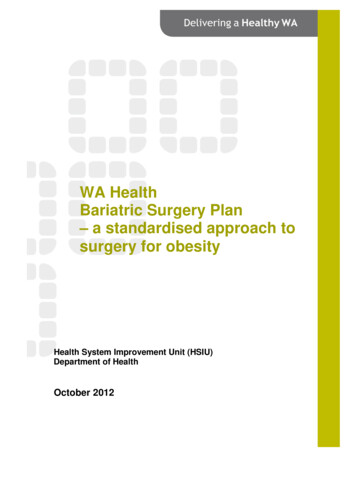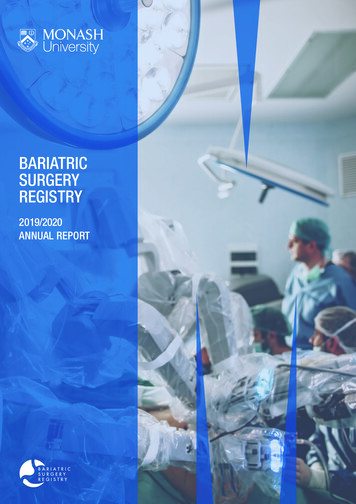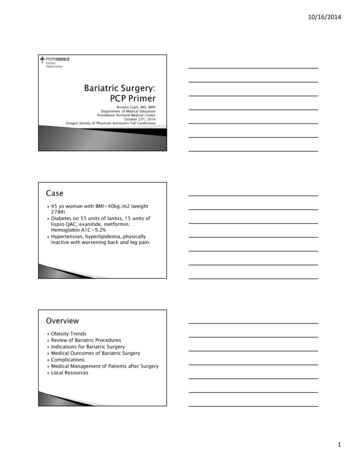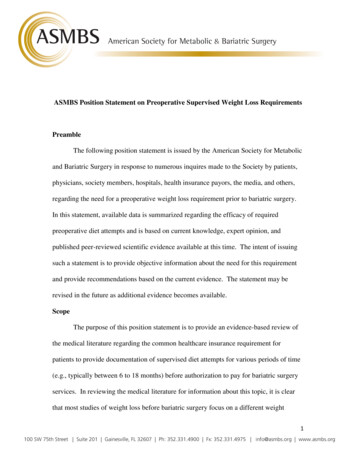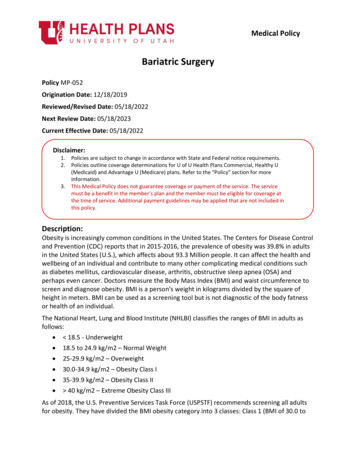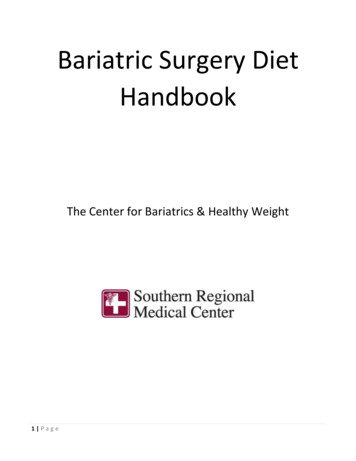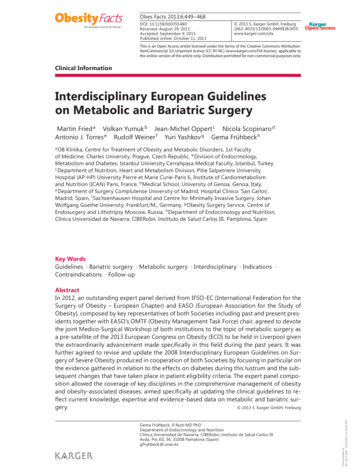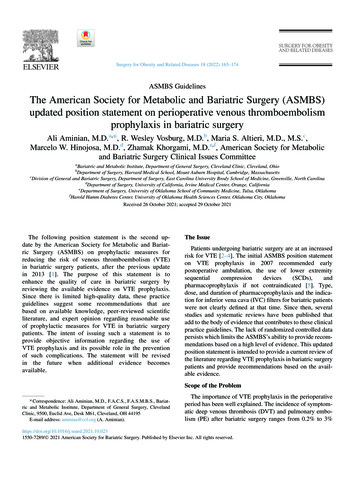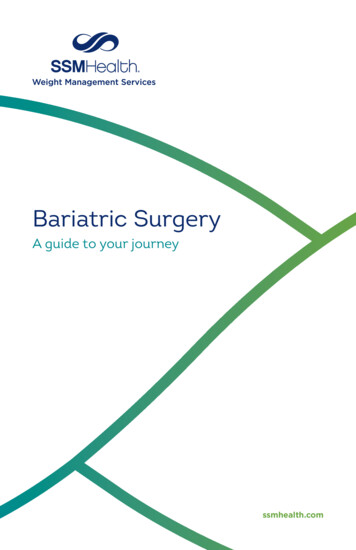
Transcription
Bariatric SurgeryA guide to your journeyssmhealth.com
Table of ContentsWelcome. 1Bariatric Pre-Surgery Checklist . 2Dietitian visits . 3Behavioral health. 3Bariatric surgery just one piece of the puzzle. 3Life-long lifestyle changes.4Meal replacement. 7Special dietary concerns. 8Healthy mealtime habits. 10Exercise guidelines . 14Surgery.18Weight-loss tracker . 20Support group attendance.21
WelcomeSSM Health welcomes you to your first step withweight loss and advanced laparoscopic surgery.We know the road to better health through bariatricsurgery is not always easy, but we are committedto seeing you through the process as efficientlyas possible.Over the next few months, you will be using thisGUIDE to navigate your way through the pre-opprocess. If at anytime you get lost .don’t worry!We will get you back on course. Our doctors,advanced practice providers, nurses, dietitians andoffice staff are here to answer all of your questionsand guide you down the road to your new beginning.Please read this manual in its entirety and do nothesitate to contact our office through MyChartwith any questions.SSM Health 1
Bariatric Pre-Surgery ChecklistPatient Responsibility Attend 3-6 support group meetings as recommended High protein dietStart Date / / Required weight loss before surgery lbs. EMMI education videosCompleted / /Required Testing EKGCompleted / / Chest X-rayCompleted / / LabsMust be fasting for 12 hours priorCompleted / / Dietitian consultCompleted / / Psychiatric consult and clearanceCompleted / /EKG, chest X-ray, and labs should be done at any SSM Health facility.Please have these tests completed 1 week before your appointment inIf you use a non-SSM Health facility, it is your responsibility to providethis office with a copy of the results.Additional items that may be required: Upper endoscopy/ / Cardiac clearance/ / Stress test/ / Pulmonary clearance/ / Pulmonary function test/ / Venous doppler/ / Sleep study/ / Diabetic education/ / Smoking cessation date/ / Discontinue of estrogen (one month before and after surgery)/ / MyChart enrollment/ / Other2 Bariatric Surgery Guide
Dietitian visitsAs part of our comprehensive program, a class with a registered dietitianwill be scheduled after your initial visit. Extra 1-on-1 visits with a registereddietitian and follow-up appointments are offered if needed prior to surgery.Registered dietitian 1-on-1 visits are often scheduled on the same day asother office visits but are not always guaranteed.Behavioral healthThroughout your journey at weight management services you will undergonumerous changes. As such, you will be required to obtain behavioralhealth clearance prior to your surgery. Your insurance will dictate whetheryou may see our clinical nurse specialists or if you need to see a psychiatristfor clearance.Bariatric surgeryJust one piece of the puzzle. Meats DairyBariatricSurgeryHighProtein Diet EggsFruits/VegetablesNo Bad Carbs Proteinsnacks/barsMultivitaminsStructuredupper bodyexercise 30 minutesa dayRegularSupportGroups Four timesa yearSSM Health 3
Life-long lifestyle changes.Habits to master now: Attend support group meetings. Eliminate carbonated and caffeinated drinks from your diet. Avoid using straws. Avoid mindless snacking. Eat only at the table and not while reading,watching TV, and/or working. Eat your protein first, followed by your vegetables. Eat slowly and deliberately, put your utensils down between bites.Meals should last at least 20 minutes, but no more than 30 minutes. Chew your food very well, at least 20-30 times per bite. Eat until satisfied not until full. Do not drink with your meal. Start a multivitamin. This can change after surgery. Exercise 20 minutes/day.Pre-op high protein dietStart date / /What is protein?Protein is the nutrient responsible for maintenance of all the tissues of ourbody. This includes bone, muscle, organs, and even hair and skin. In addition,protein helps the body function properly. The average woman needs60 grams of protein a day and the average man needs 60-80 grams ofprotein a day to stay healthy.Your best sources of protein are: lean cuts of meat, fish, low-fat/fat freemilk and dairy products, eggs, certain vegetables, certain protein bars, andprotein shakes.When preparing foods avoid the following: Breading Sautéing Salad dressing in any significant quantity Cooking in butter, oil, or high calorie/fat products Frying (an air-fryer is acceptable)4 Bariatric Surgery Guide
What should I be eating before and after bariatric surgery?You need to eat 60-80 grams of protein per day. Boneless, skinless chicken breast Turkey breast, skinless, whole or ground Lean ground beef (no more than 8% fat) Trimmed cuts of beef (no more than 8% fat) Trimmed cuts of pork loin or pork chops Grilled or baked fish – salmon, tilapia, tuna (not breaded or fried) Canned tuna or chicken (packed in water not oil) Eggs Tofu Cottage cheese (low fat) Greek yogurt (low fat) Protein shakesProtein sourceAmount of protein1 oz chicken7 grams1 egg7 grams1 cup low-fat cottage cheese25 grams3 oz venison26 grams3 oz salmon17 grams1 oz is about the size of a matchbox; 3 oz is about the size ofa deck of cards.SSM Health 5
VegetablesYou should eat low carbohydrate vegetables (listed below)(not breaded or fried) Asparagus Greens Broccoli Lettuce Brussel sprouts Mushrooms Cabbage Onions Carrots Peppers Cauliflower Radish Celery Spinach Cucumber Tomato Green Beans ZucchiniSpices/flavoringsSuggested spices/flavorings for meat and vegetables:6 Basil Mushrooms (fresh) Bay leaf Nutmeg Caraway Onion or onion powder Chervil Oregano Chives Paprika Cloves Parsley Curry Pepper Dill Rosemary Dry mustard Saffron Garlic or garlic powder Sage Ginger Savory Green pepper Tarragon Lemon juice Thyme Mace Tomato Marjoram Turmeric Mint Vinegar Bariatric Surgery Guide
Meal replacementA protein supplement will be used before surgery as a meal replacement.Your bariatric surgeon may have you replace 1-2 meals a day with aprotein supplement.Your protein supplement must meet the following guidelines: Select a whey-based protein powder-whey isolate or whey concentrate Protein powders should be mixed with water, skim milk, or a non-fatdairy milk source Protein 25-30 grams Carbohydrates less than 10 grams Fat less than 5 grams Sugars greater than 5 gramsExamples: Premier protein Bariatric advantage Elevation Protein Powder Nectar/Syntrax Whey Protein Isolate Powder Genepro Protein Powder Ensure High Protein Max Pea protein (vegetarian/vegan)SSM Health 7
Special dietary concernsCaffeineCaffeine is a stimulant and is naturally found in more than 60 plants,including cocoa, tea, and coffee. Caffeine is also added to soft drinks andis often a component of many over-the-counter medications and dietarysupplements including certain protein powders and drinks. Caffeinetemporarily speeds up the body’s heart rate, boosts energy, and is oftenused to fight “fatigue”. Caffeine also acts as a diuretic, which can causedehydration. As a result, caffeine can leave you feeling thirsty if you use itas your main source of fluid intake. The recommended intake of caffeine isdefined at 300 milligrams or no more than two 8-once cups of coffee perday. Decaffeinated tea and coffee contain a small amount of caffeine.If your diet contains a large amount of caffeine, you should decrease yourintake gradually. This will help to avoid headaches caused by withdrawal.Your surgeon will ask you to stop all caffeine for 2 weeks after surgery.ConstipationWith the consumption of a high protein diet constipation can becomea problem. Drink at least 64 ounces of fluid per day, exercise, consume highfiber food such as vegetables, and taking 30 grams of fiber supplementstwice daily with liquid will help relieve constipation.8 Bariatric Surgery Guide
Heartburn/GERD/reflux esophagitisThis is painful inflammation of the esophagus that is often caused by theregurgitation of stomach contents. Antacids ease the burn but do NOTcorrect the problem. Follow the following tips to decrease/eliminate GERD: Avoid high fat, fried, and spicy foods Avoid coffee (regular and decaffeinated) and foods containingchocolate, cocoa, peppermint oil, and spearmint oil Avoid tomatoes, tomato juice, citrus juices, alcohol, and pepper Avoid chewing or sucking on breath fresheners, gum, and lozengeswhich can produce stomach acid Do not eat 3-4 hours before lying downLow-calorie sweetenersLow-calorie sweeteners are those containing few calories per serving, whileproviding sweetness to both liquid and solid foods. Acceptable non-nutritivesweeteners are Splenda (sucralose), Equal (aspartame), Sweet n’ Low(saccharin), and Stevia.These are all FDA approved for long term use and can help advance to alow-sugar lifestyle. Always read the labels of foods and beverages saying“diet” or “low calorie” to check for specific calories and the types ofsweeteners used. “Sugar free” does not always mean calorie free.Be careful with sugar alcohols (sorbitol, mannitol, xylitol, etc.), often foundin “sugar-free” products. They can add both additional calories and potentialgastrointestinal distress (for example: bloating, diarrhea, and gas).Taking controlIt is much easier to resist food when it is not in front of you. Listed below areseveral ways of eliminating food cues: Store foods, particularly those that are high in calories in opaque(cannot be seen through) plastic containers Clean out the kitchen shelves so that there are no high calorie foods Keep all food in the kitchen at all times Don’t keep your favorite high calorie foods in the house Do not buy unhealthy foodSSM Health 9
Healthy mealtime habitsMealtime activities are especially difficult for staying on track. Payingclose attention to the pleasure involved in eating will help you get moresatisfaction from your meals. Some ways to overcome temptations andbecome a gourmet eater are: Serve food right onto plates rather than family style Avoid leaving serving dishes on the table Use smaller dishes to make servings appear more generous Designate one place to eat all meals Leave the table immediately after eating Store leftovers in divided meal containers designed for portions Eat only when you are physically hungry Avoid all other activities while you are eating (except talking to others) Eat slowly, consciously take small bites and chew thoroughly Put utensils down between bites Make sure your meal lasts at least 20 minutes. It takes approximately20 minutes for your brain to receive a signal from your stomach thatyou are full Wear something snug around the waist and hips You do not have to finish your plateGrocery shoppingIt is much easier to avoid the wrong foods in the grocery store than it is toavoid them at home. Here are some suggestions to increase the likelihoodthat you will deal with eating temptations in the grocery store effectively: Do not shop when hungry Make a shopping list before you go and stick to it Shop around the outside of the store. Avoid the aisles which containmany processed, high-calorie foods Shop protein first followed by vegetables and fruits10 Bariatric Surgery Guide
Social supportLosing weight can be hard work. Asking for assistance from friends and familymembers is okay. Let others know that you have set goals aimed at takinggood care of yourself. For example, you may want to try the following: Ask others to serve themselves food Ask others to help in cleaning up after meals Ask others not to eat your favorite foods in front of you Attend support group meetings for the rest of your lifeSSM Health 11
Helpful eating behaviorsAt home: Enlist the support of family members Prepare meals when you are not hungry Ask family members to prepare their own snacks Get involved in activities you enjoyAt work: Do not bring change for the vending machines Do not eat at your desk Take a prepared lunchCoffee breaks: Take a walk for the first half of the break Use this time for relaxation exercises Read a favorite bookAt restaurants: Don’t go hungry. Have your meal or protein shake before goingout to dinner. Ask server for fresh lemon and vinegar for your salad or bringdressing with you Look for restaurants that have salad bars, vegetable platters,and lite menus Ask the server to eliminate fattening dressings, sauces, etc. Eat steamed or broiled foods not fried Share an entrée with others or eat from the kid’s menuWhen alone: Remind yourself of your priorities: weight loss being #1 Set up an attractive place setting at the table Avoid activities which trigger urges to eat Engage in enjoyable activities other than eatingEating with others: Communicate to others that you have made a commitment tolose weight Ask friends not to offer you dessert or other fattening foods Politely refuse second helpings when they are offered12 Bariatric Surgery Guide
At the holidays: Plan ahead what you will eat Determine alternative ways to enjoy yourself without eating Prepare a healthy protein dish that you (and others) can enjoy to taketo an eventOn vacation: List activities you can do that are unrelated to eating Reserve accommodations with cooking facilities Eat out only one meal a day Bring your protein sources: shakes, powder, water, barsCravingsLearn the difference between physical and psychological cravings. Physicalcravings only occur when the body is lacking an adequate supply of specificnutrients. A psychological craving is a strong desire for a specific foodthat is not based on need. Our dietitians will help you learn the differencebetween these two types of cravings.SSM Health 13
Exercise guidelinesTo lose weight, you need to burn calories. The more calories you burn, themore weight you will lose. Patients are recommended to follow the Office ofDisease Prevention and Health Promotion’s recommendations to engage in: Aerobic exercise - at least 30 minutes per dayExamples: brisk walking, dancing, boxing, swimming, water aerobics Muscle-strengthening exercise - at least 2 times per weekExamples: resistance bands, free weights, punching bag (pleasereference the following exercise pages for examples) YouTube videos are a great resource for guidanceNeed help getting started?NEXT Program - Nutrition and exercise training program Before starting the NEXT program, all participants should checkwith their health care provider to ensure you are healthy enough toparticipate in an exercise program of this type Please contact our weight management office for more information onthe NEXT program14 Bariatric Surgery Guide
Upper body exercisesStand and boxWall push-upArm curlsBench arm liftsSitting weight liftsResistance bandSSM Health 15
Lower body exercisesLeg squatsLeg liftsHeel and toe16 Leg scissorsBariatric Surgery GuideChair-assist squat
Do NOT use nicotine productsBariatric surgeries and smoking do not go hand in hand! All SSM HealthWeight Management Services patients are required to quit smokingcigarettes, cigars, vaping, and using chewing tobacco at least 8 weeks priorto surgery. Abstinence from nicotine products must be LIFE LONG. Theuse of any nicotine product after weight-loss surgery causes serious healthcomplications including, but not limited to, poor wound healing, severestomach ulcers, blood clots, stomach perforations, and bleeding.Please use the following resources to help you accomplish your quitsmoking goal: Illinois Tobacco Quitline 1-866-QUIT-YESThe Illinois Tobacco Quitline is a free telephone resources that providesquit smoking counseling and nicotine replacement therapy productssuch as nicotine patches to those who want to quit tobacco use.NotesSSM Health 17
SurgeryPre-surgery class/appointmentAll patients will be scheduled to attend a mandatory pre-surgery groupeducation class 2-3 weeks prior to your surgery date. You will also have anappointment with your surgeon in the afternoon on this day.You MUST bring your support person to this class.At the beginning of class, you will be given a folder.The contents of the folder are: Right side – Important information regarding your surgery Left side – Surgical consents. These consents must be read and signedby you and support person where indicated before your afternoonappointment at SSM Health.You WILL NOT be seen for your pre-surgery appointment at SSM Healthuntil all your consents have been signed.Medications that need to be stopped before surgery1. Steroids: No steroids for 4 weeks before and 6 weeks after surgery. Nolong-term steroid use after surgery.2. Vaccines: No vaccines 4 weeks before or after surgery.3. Estrogen containing hormone replacement products/birth control pills:Stop 1 month before surgery and 1 month after surgery. Depo Proverashots/IUD’s/Nuva Ring implants are acceptable.4. NSAIDS: Stop 2 weeks before surgery and do not use after surgeryfor the rest of your life. Examples: Ibuprofen, Advil, Aleve, Naproxen,Celebrex, Motrin, etc.5. Blood thinning agents: Stop no later than 5-7 days before surgery unlessotherwise instructed by your cardiologist and agreed upon by yoursurgeon. Examples: Aspirin, Plavix, Warfarin, Coumadin6. Oral diabetic medications: Stop 3 days before surgery and start slidingscale insulin. Examples: Glipizide, Metformin7. Diuretics (water pills): Must be stopped 2 days before surgery.18 Bariatric Surgery Guide
FMLA paperworkFMLA paperwork may be turned into the nursing staff prior to surgery. It isnot typically filled out until the week of your surgery. Please only fill out theemployee information portion. If any of the healthcare provider informationportion is filled out, the paperwork will be returned to you without beingcompleted and you will be asked to provide a new copy with only theemployee portion filled out.The office may take up to 7 days after the receipt of your paperwork (orafter surgery) to complete it. You will be notified when your paperwork hasbeen completed.All FMLA is approved for time off beginning with your day of surgeryuntil your 1 week after surgery visit. If more time is needed, please discussextending FMLA with your surgeon at your 1-week appointment aftersurgery.If needed, please request a return to work note. It will be issued at your1-week post op visit with a weight restriction if indicated.SSM Health 19
Weight-loss trackerInitial weightBefore surgery month 2Before surgery month 3Before surgery month 4Before surgery month 5Before surgery month 6Before surgery monthSurgery day weight1 week after surgery1 month after surgery3 months after surgery6 months after surgery1 Year after surgery20 Bariatric Surgery Guide
Support group attendanceIt is mandatory that all patients attend a minimum of three (3) or six (6)support group meetings prior to surgery. Please ask the support groupleader to document your attendance by signing below:Date: / /Date: / /Date: / /Date: / /Date: / /Date: / /You must bring this book with you to all appointments and support groupmeetings. Thank you for your cooperation.In the event of inclement weather or emergency situations, it may benecessary to cancel or postpone a scheduled support group.All scheduling changes will be communicated via our Facebook page and,time permitting our website.SSM Health 21
LocationsWeight Management Services at SSM HealthGood Samaritan Hospital5 Good Samaritan Way, Mount Vernon, IL 62864618-899-1264Weight Management Services at SSM HealthSt. Mary’s Hospital432 N. Pleasant Ave., Centralia, IL 62801618-436-8300ssmhealth.com 2021 SSM Health. All rights reserved. WMS-IL-21-1086780 8/21
SSM Health welcomes you to your first step with weight loss and advanced laparoscopic surgery. We know the road to better health through bariatric surgery is not always easy, but we are committed to seeing you through the process as efficiently as possible. Over the next few months, you will be using this

